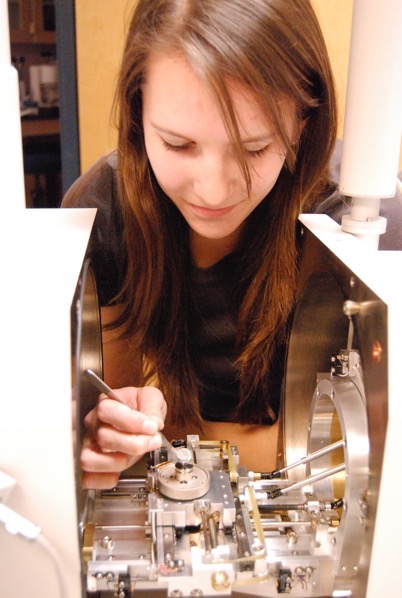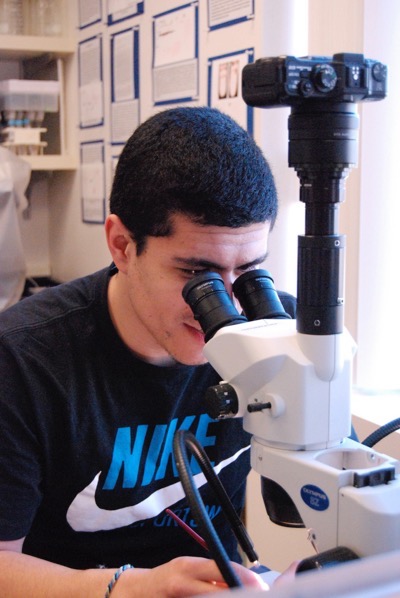Teaching

Pedagogical Philosophy
My pedagogical philosophy in undergraduate science education advocates for the immersion of students in the practice of investigative, hypothesis-driven science as a way to learn the scientific process, to acquire and develop science process skills, to understand the reality and challenges of science, and to be given the opportunity to become creators of knowledge. In short, I believe that science should be taught as it is practiced. Therefore, my goal as a teacher, beyond teaching students fundamental concepts in molecular biology and genetics, is to engage students in the process of science. Partnering with students in rigorous, authentic experimental research is central to many careers in biology and is critical in providing students the opportunity to acquire and develop science process competencies that include writing research proposals, formulating hypotheses, designing and performing experiments, troubleshooting problems, interpreting data, reading and synthesizing the scientific literature, and effectively communicating their scientific results. Participation in investigative research also has the added benefit of assisting students in developing general life skills that includes; enhancing their ability to work and collaborate with others, promoting effective time-management strategies, strengthening organizational skills, increasing proficiency in prioritizing and planning, and improving critical thinking and interpretation of information. In essence, my aim is not teach students biology, but rather to train students to become biologists.
Courses of Instruction
Biol130 Cell Biology and Genetics
Biol130 Cell Biology and Genetics is an introductory course for students who are considering a major in biology, biochemistry or a career in biomedical sciences. All organisms are composed of cells. By developing a fundamental understanding of the structure and function of cells, students will be prepared to address interesting contemporary questions such as how cells communicate with each other and achieve homeostasis in the organism; how disease arises; how organisms reproduce, mature and die; and how the environment impacts organism/cellular behavior and health. By studying genetics and the molecular biology of the cell, students will have the foundation to make the connection between phenotype and genotype; to understand how external signals influence gene expression and how the potential for heritable genetic change is a key feature of evolution.
Biol333 Gene Structure and Function
Biol333 Gene Structure and Function focuses on the study of the principles of heredity in microbes, plants and animals. It is an integrated course in classical and contemporary molecular genetics dealing with such topics as: the structure of DNA, RNA and proteins, Mendelian genetics, extrachromosomal inheritance, non-Mendelian inheritance, epigenetics, gene interactions, gene regulation, mutagenesis, and recombinant DNA technology.
Biol350 Molecular Genetics (W)
Biol350 Molecular Genetics is a research methods course with a focus on the structure and function of genetic material at the molecular level. Topics to be explored include: DNA, RNA, proteins and their interrelationships through the "Central Dogma" of information transfer; genetic regulation; recombinant DNA and genetic engineering; genetic screening. Special emphasis will be on placed on developing student skills as future biologists through a variety of instructional resources including group discussion, critical analysis of the primary literature, and collaborative and independent research projects utilizing the model system Drosophila melanogaster.
Biol350 Molecular Genetics Class - 2010
Biol350 Molecular Genetics Course Retreat 2010
Biol350 Molecular Genetics Class - 2012
Biol350 Molecular Genetics Course Retreat 2012
Biol350 Molecular Genetics Class - 2013
Biol350 Molecular Genetics Course Retreat 2013
Biol350 Molecular Genetics Class - 2017
The Art of Science/The Science of Art - 2017
Biol350 Molecular Genetics Class - 2018
The Art of Science/The Science of Art - 2018
Conference Presentation - An Inquiry-Based Approach to Teaching Undergraduate Students Molecular Genetics.pdf - *Lauren Hagel, *Emma Hill, *Zachary Hutchinson, *Megan Moore, *Stephanie Skelly, *Romain Tropée, *Jessica Walker, *Michael Bown, *Haylee Chung, *Audrey Davis, *Melissa Gabler, *Morgan Iveson, *Saneet Johal, *Emma McNeil, *Hayley Serres, *Victoria Smith, *Tyler Starr, *Sally Venable, *Joshua Wong and Jason E Duncan - Willamette University, Salem, OR – The Genetics Society of America – 53rd Annual Drosophila Research Conference, Chicago, IL


